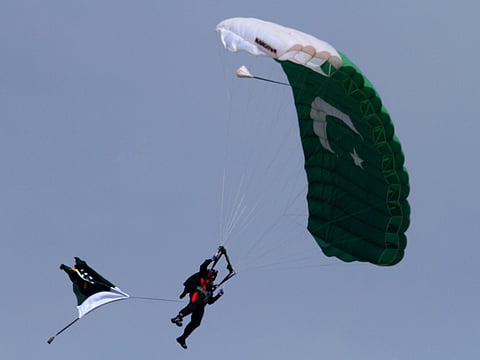Reinvigorating Pakistan
Improving governance, delivery, education and infrastructure remains the key

At daybreak on March 23, Islamabad reverberated with the sound of the 31-gun salute to Pakistan’s National Day, commemorating the 1940 Muslim League Resolution to achieve a homeland for the Muslims of British India. I recalled that in 1991, before Independence Day on August 14, there was speculation that the flag-hoisting ceremony on the parliament lawns may be cancelled due to rain. My father, an army officer and diplomat of the old school, was dismissive, saying no serious country would cancel a national event for such a reason.
But as terrorist attacks increased, the flag-hoisting ceremony was moved inside the nearby Convention Centre. The March 23 military and folk arts parade along the public-lined central boulevard to salute Pakistan’s leaders and be applauded by civilians, military and diplomatic guests in full sight of the parliament and President’s House did not take place after 2008.
This year it did, though the venue was changed, partly for prudence and partly owing to construction of a metro. This resumption projected confidence. For Pakistanis at home and abroad, tired of their country being the subject of criticism and doubt, yearning for good news and something to identify with, it was reinvigorating. A traditional parade — with military units — a fly-past, stand out for those children who had not seen it before. Not that they were unaware that so much yet remained to be done to fulfil the aspirations of the founding fathers of the nation and a whole generation that had sacrificed so much to shape a new country.
What does this renewed confidence signify for Pakistan at home and abroad? In purely military terms, Pakistan, as a nuclear power, carrying a big stick, can afford to speak softly. This event is in earnest that after a long spell of policy vacillation and lack of consensus and focus, tackling terrorism is now centre stage. The military has swung into action. Plans are being formulated. However, implementation has always been a weak point and the government has to fully back up this counterterrorism action and ensure intelligence coordination, which, as the 9/11 report showed, is problematic everywhere to rid the country completely and permanently of this menace.
One reason for the appeal of extremism has been the growing disparity between the affluent and the underprivileged. When shelter, education, health and job opportunities are not adequately provided by the state, those deprived of these basic entitlements feel no reciprocal obligation and many turn to movements promising speedy justice, redistribution of assets and force of arms to achieve that. Not that this is unique to Pakistan. In India, similar conditions have led to a widespread and equally troubling Maoist insurgency over a large area.
Improving governance, delivery, education and infrastructure remains the key. Pakistani politicians and the now-eroded “iron frame” of the bureaucracy will have to improve their performance to hold the ground that military and security forces have regained in terms of space and time. There is a consensus among the government, political parties, as well as the military, that Pakistan must have better relations, or at least tension-free relations with all its neighbours. With Afghanistan, relations are on the mend despite scepticism from some Afghan quarters. A stable Afghanistan means stable 2,565km of borders on Pakistan’s western flank.
Relations with India are a bigger problem. Pakistan is torn between a desire for better relations and its obligation to the Kashmiris. Balancing these objectives is half the problem, India’s policies the other half. Under president Pervez Musharraf, a formula to give maximum autonomy to both parts of Kashmir, with freer movement, evolved with his counterpart Manmohan Singh. But the momentum was lost on an already controversial plan. There is a constituency in Pakistan for better relations, though appearing less in evidence in India.
The Bharatiya Janata Party-led government in India and its leader have yet to decide whether a stable, terrorist-free Pakistan, which it publicly calls for repeatedly, is in its favour; or whether the weaknesses it perceives and tries to accentuate are more in its interest for attempting to “manage” its neighbour.
Pakistan should think innovatively to encourage a constituency in India. Liberalising trade is not on the cards, though realising and sharing oil and gas pipelines from Turkmenistan and Iran would build confidence. Earlier this month, when the foreign secretaries of India and Pakistan met it was Pakistan, rather than India, that had called for “greater people-to-people contacts and friendly exchanges in building a relationship of trust and friendship”.
The promise of the model of agreed measures for people and trade to cross over in Kashmir remains unfulfilled. These mechanisms need to be pushed and the Pakistani proposal of 2007, for a helicopter service between Muzaffarabad and Srinagar, revived. The two Punjabs hold much promise. A 24-hours visa at Wagah border post, with biometrics to take care of security concerns, to visit Lahore or Amritsar would attract the nostalgic older generation and their curious younger relatives.
While encouraging a constituency in India is important, at the end of the day, strengthening Pakistan internally to enable its industrious and resilient people to achieve their potential remains the major objective. Then all its neighbours and beyond would themselves desire more meaningful engagement.
Tariq Osman Hyder is a retired Pakistani diplomat.


